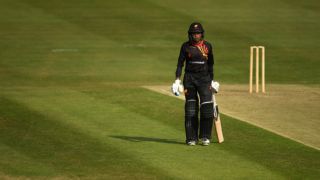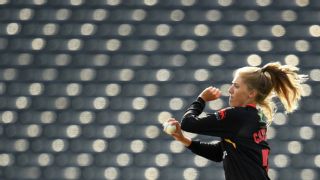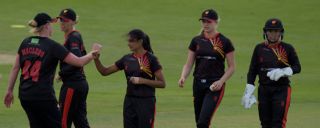|
When Kate Green starts working with an athlete, the conversation usually begins with her asking a question and goes something like this: "So you're a really good batter, do you still work in the nets?"
"All the time."
"You're really strong... / One of the physical attributes you're known for is your speed... Do you work on that?"
"Yeah."
"So you're working on your strengths, all the time, okay. Psychologically are you strong?"
"Yeah, I'm fine psychologically."
"Do you work on that?"
"No, why would I work on it because I'm fine?"
"Well you work on the other areas that you're fine at to make sure that they're super strengths." Green is a trained practitioner specialising in performance psychology and personal development. She works with the Lionesses in football and was recently appointed as Psycho-Social Lead for the Sunrisers cricket team who, regardless of her fascinating job title, just call her "Kate". It's all part of normalising conversation about the mental aspects of being an elite sportsperson as much as the physical side of training and it is an area Green and Danni Warren, Sunrisers' Regional Director of Women's Cricket, are passionate about. "It's really about helping each individual in a young team, an inexperienced team, in a world that no one's been in before," Warren tells ESPNcricinfo. "We've gone from having a purely amateur game to professionalising it and expecting players and staff to be able to deal with those pressures." Sunrisers are one of eight teams which contested the inaugural Rachael Heyhoe Flint Trophy last year. The same eight teams will play in that competition again in 2021 as well as the new Women's Regional T20 after 41 women signed professional contracts for the coming season. Those contracts are awarded in addition to the 17 centrally contracted England Women's players as part of the ECB's restructure of domestic women's cricket. Sunrisers encompass the London & East Region, including Middlesex, Essex and Northamptonshire. Their squad ranges in age from 17-29, five of whom - Naomi Dattani, Cordelia Griffith, Amara Carr, Jo Gardner and Kelly Castle - hold professional regional contracts. "I think back to around this time last year where I had the opportunity to ring a handful of girls and tell them that they were going to get a full-time professional contract," Warren recalls. "They had worked for many years to get this, and it had been what they were about. "Speaking with some of them it was, 'we'd achieved what we set out to do', you felt a weight lifted off your shoulders. Then about a week later you realise now you've got to live up to the expectations of that contract."  Driving Warren's vision for helping players develop as people and athletes was the fact that most of the women and girls in the new structure won't have been through an academy system that supported their personal and professional development in the same way as their male counterparts. That will gradually change with Sunrisers last month announcing a 14-strong academy intake. "In the men's game, by the time you get a full-time contract at 19, 20, 21 you've had six, seven years of support," Warren says. "So I was really keen and Kate being available gave us the experience level that we needed for this." During her 18 years in the field, Green has worked extensively with the boys' academy system, county professional teams and England at U17, U19, Lions and elite level. She held a senior performance role at UK Sport working with Olympic and Paralympic athletes before heading into football and then, last year, setting up her own consultancy. "What we were really keen to do was offer the girls support for them as a person and as a player, and so that's why it is this more holistic and well-rounded psychological and personal development support," Green says. What became clear from her early days helping academy players 15 years ago was that these young people needed help as they grew into adulthood in the tough environment of elite sport. "They're people navigating the world, making sense of life, and then you add in all this complexity of performing under pressure and all the weight that that brings, both in expectation from the badge but also that you put on yourself," Green says. "I just try and help people navigate that and then try and help teams work better together to try and create that psychological safety that enables you to perform under pressure." So if the desire for guidance has been there for so long, why is there still a stigma attached to psychology? "In my opinion it's been not funded equally alongside the physical and technical and tactical development within the games," Green says. "So we've always been the last one at the table. "Psychs are consultants normally or part-time, they're not a full-time member of staff like others. So it was always seen as an added extra and invariably then it was when there's a crisis. It's positioned in a medical framework of when there's a problem. "For me good, positive psychology and personal development is proactive and it's done equally to the physical counterparts, so you've got a parity between your physical and your mental health. That's health being the optimal word rather than ill-health. No one wanted to have a problem, and therefore you avoid it or you try and deal with stuff on your own." And while there's long been the assumption that this attitude pervades men's sport, Green has discovered it's not only among men, or even exclusive to sport. "I think it's across sport and society," she says. "If it's positioned as something you need for help, that's always [met with], 'well I won't go until I need help, until I'm at breaking point'." So with the Sunrisers and the Lionesses, Green has those conversations about working on mental attributes as well as physical ones. She has agreed with players she works with that regular meetings between them are "normal". "It's not like, 'I've been sent to her,' it's more, 'oh yeah you're catching up with Kate because that's what we do,'" Green says.  The main themes that Green deals with fall into sports and life categories. Issues such as selection and non-selection, injury and performance as well as relationships, education and career options beyond sport. You could call it prevention rather than cure, or simply proactivity and preparedness.
The main themes that Green deals with fall into sports and life categories. Issues such as selection and non-selection, injury and performance as well as relationships, education and career options beyond sport. You could call it prevention rather than cure, or simply proactivity and preparedness.
"I focus on always be prepared for the unexpected," Green says. "Never presume if you sit down with a batsman who's just scored 160 runs, he's going to be okay. People tend to go, 'oh he's scored 160, he must be great, or she must be fine.' "There's some very secret battles that go on. I've worked with numerous players where there's been all sorts going on and then they still perform, we're talking about highly functioning people. "That's where it gets a bit harder for athletes than it does people in society. They're still functioning in their environment but it is starting to come out. They're not performing like they want to, or they're putting their body through the wringer by being sick before every time they go out to bat or bowl, or play a game because the anxiety is so high." Early on, Green was staggered to discover how common it was for athletes to experience signs of extreme stress and think it was normal. "I do a lot of education on the psych response in the body, so that they understand that if their eyes become a bit more blurry or their sound goes a bit - their hearing - that's high-level anxiety playing out which is protecting your body under threat," she explains. "We talk through what is normal but what is also his or her choice. As in, that might be normal in performance, and under stress, but it doesn't mean you have to live with it. "What I was finding when I first came into the job was more senior athletes have been doing this for years to themselves and thought it was part of performance. I was saying, 'I know a lot of high-performing people who don't have to put themselves through that to perform. Is there another way we could do this to make it more sustainable?' "What we don't want is people putting their bodies and minds through all sorts to get through a career and then have a really difficult time in a big tournament and get sent home, or choose to come home and bow out of the game that way." Warren is also determined not to see players end their careers in that fashion. On the contrary, she wants to keep them in sport, even after their playing days are over. "In 10, 20 years' time, I'd like to be able to sit here and see all of these players and staff continuing to be active in the game, continuing to give something back because we gave them the opportunity to survive in the rocky world of professional cricket," Warren says. And she hopes the benefits stretch beyond the cricket field. "The more we can have these conversations about it, then the general public will be able to hear the stories, they'll be able to feel comfort in knowing that people that they look up to work very hard at that element of their life," Warren says. "Hopefully it will make people more willing to reach out when they feel they need to reach out, because they know that you're not unique, you're not on your own. Everybody goes through it, whichever walk of life you choose to go down."
|

